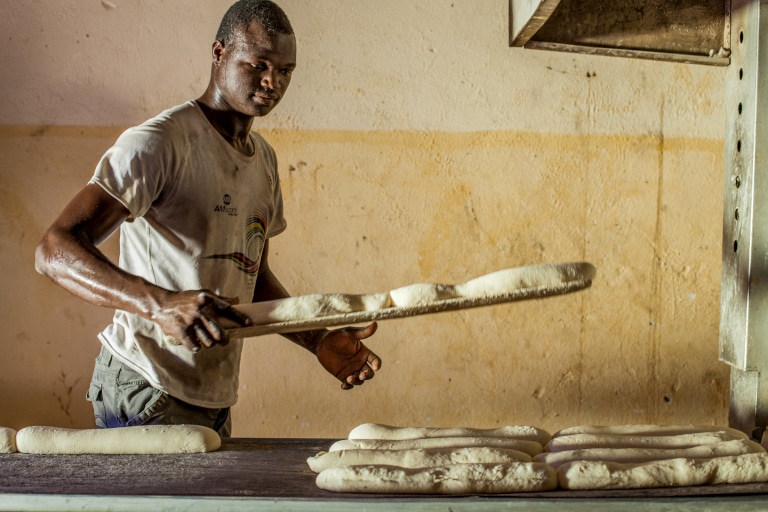The entrepreneurs of the energy transition
Geres has been working for many years alongside entrepreneurs in the field and has realized that entrepreneurship and local economic development have a role to play in ensuring the sustainability and scaling up of its efforts in favour of the energy transition.
Energy, a vector of economic development
The international community recognizes that the poorest are paying for the most expensive, least efficient and least sustainable energy, apart from the fact that around 2 billion people still do not have adequate access to energy to meet their primary needs and 1.6 billion people have no access to electricity at all. Energy access and energy-efficiency are nevertheless priorities for developing countries and potential vectors of sustainable economic growth and significant social and environmental impacts.
For example, it is estimated that electricity shortages cost sub-Saharan countries up to 2 percentage points of GDP per year and hold back local processing of products which could significantly increase the added value created in those territories.
Barriers to be lifted to facilitate access to sustainable energy solutions
Although energy solutions do exist, it is clear that their wide-scale dissemination is hampered by the substantial investment required, the lack of physical capital and training needs. The challenge for Geres is therefore to demonstrate the economic viability of sustainable energy access and energy efficiency solutions in different contexts, where the common denominator is the population’s degree of poverty, and to lift the barriers encountered by entrepreneurs in accessing those solutions. The energy transition should make it possible to achieve improvements in the local population’s well-being and support their resilience in those territories.
Support for entrepreneurship at the heart of Geres economic development approach
For many years, Geres has been working alongside entrepreneurs in the field and has realized that entrepreneurship and local economic development have a role to play in ensuring the sustainability and scaling up of its efforts in favour of the energy transition.
Drawing on its experience, Geres concentrates its economic development efforts on supporting and building the capacity of local businesses (SMEs) and entrepreneurs so that they can make the most of the new energy situation arising from the projects we run. In Mali, as part of our energy access work in rural areas to develop economic activities, a support scheme for entrepreneurs has been put in place to help them during the crucial phases of their development and maximize their chances of success. A genuine development tool, this support scheme has been made to measure for the first Electrified Business Park (EBP) in Konséguéla and can now serve as a methodological framework for other territories, suited to the rural environment of Sahelian regions with significant potential. After an initial assessment, businesses wishing to operate in the EBPs set up by Geres receive personalized support and thematic training on management, administration, marketing, etc.

This is complemented by the development of financial mechanisms appropriate for entrepreneurs remote from existing financial systems, in order to facilitate access to credit to purchase equipment or domestic energy solutions. In Mongolia for instance, a partnership has been signed with the XAC Bank, accredited to the Green Fund, to offer loans at a rate 50% cheaper than a traditional loan, in order to promote energy renovation of housing in particularly vulnerable neighbourhoods on the outskirts of Ulan Bator. In Morocco, a partnership with a micro-finance association (Al Karama Microfinance Foundation) has facilitated access to low-energy ovens for around 300 small-scale bakers.
Finally, we support structuring efforts by identifying gaps and facilitating the emergence of the necessary structures in various sectors. In Myanmar, for example, we aim in particular to support the creation of an intermediate structure, bringing entrepreneurs together to complete the value chain and promote the rollout of sustainable energy solutions in the most isolated areas (drawing up a business plan, supporting the start-up of activities, etc.). In Mali, the rural electrification project also plans to establish a social enterprise to manage the electrified business parks so that the continuity of the infrastructure is ensured. Our thanks go to the Prince Albert II de Monaco Foundation, Synergie Solaire and Nexans Foundation for their contributions to this scheme.
At present, Geres is applying this economic development approach in six countries: Afghanistan, Mali, Morocco, Mongolia, Myanmar and Tajikistan. This multi-country approach demands significant resources. If you’d like to talk about it, contact-us.
Article co-written by Romain Cres, economic development programme manager, and Léa Watine, partnership officer for Geres.
A director of several SMEs over a period of 10 years, Romain Cres then took part in the management and consolidation of rural micro-finance institutions in Africa before joining Geres in 2016. His role is to provide technical support for projects on the theme of support for entrepreneurship, as well as to co-ordinate analysis and participatory capitalization work with a view to learning the lessons from the field to help improve the relevance, efficiency and sustainability of energy-related development projects.
WOULD YOU LIKE TO TAKE ACTION
AND SUPPORT WHAT WE DO?
Tell us who you are and find your means of action.
